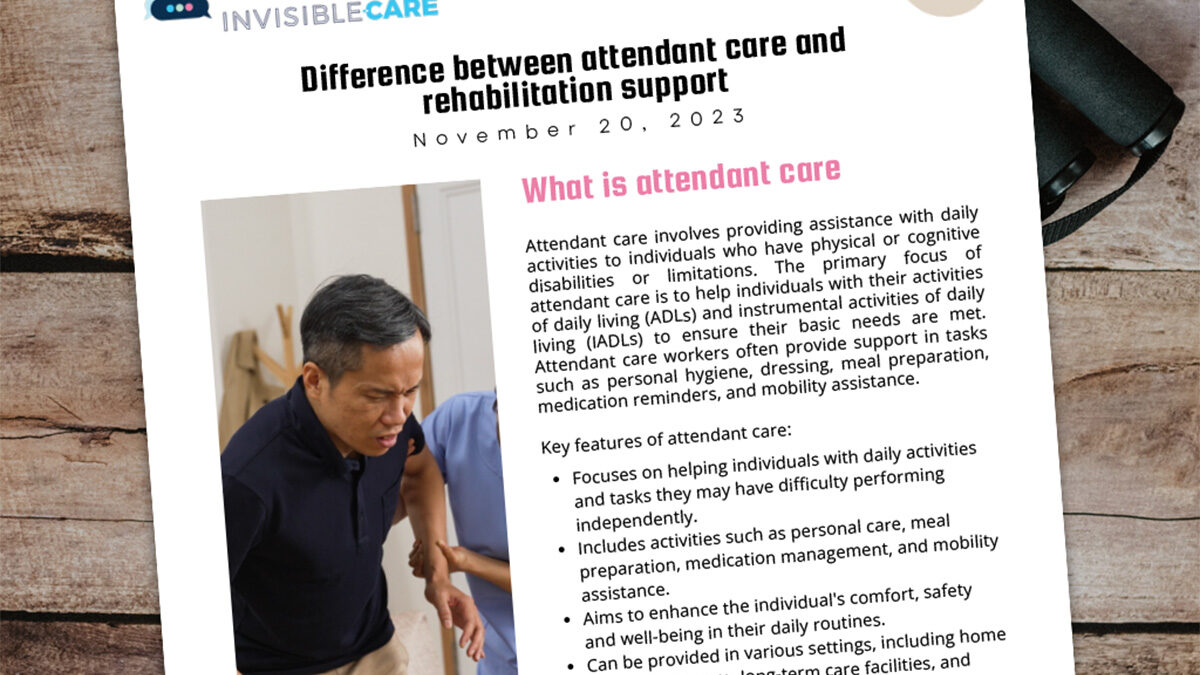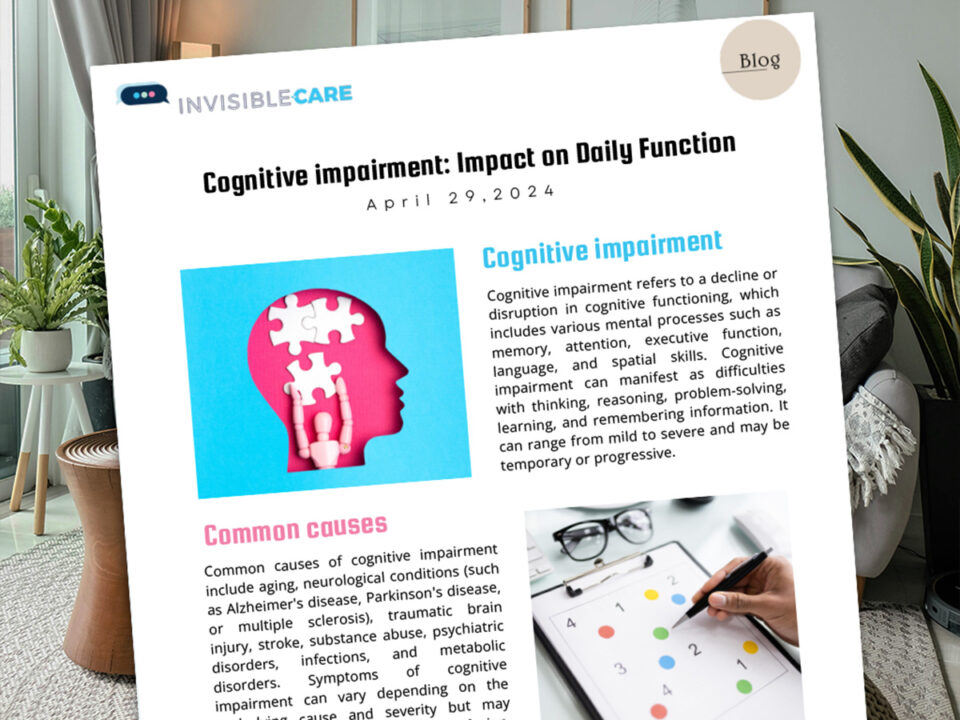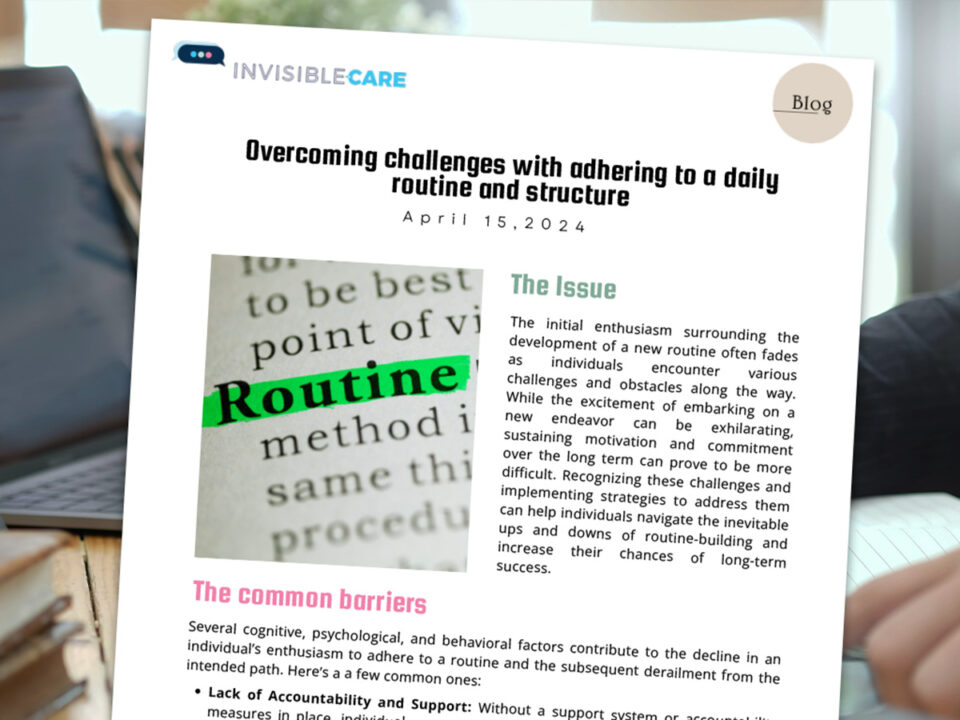
Invisible Care – The Importance of Self-Care Interventions
November 6, 2023
The Impact of Brain Injury on ADLs
December 4, 2023What is attendant care?
Focuses on helping individuals with daily activities and tasks they may have difficulty performing independently. Includes activities such as personal care, meal preparation, medication management, and mobility assistance.
Aims to enhance the individual’s comfort, safety, and well-being in their daily routines. Can be provided in various settings, including home care, remote care, long-term care facilities, and community settings. Requires strong interpersonal skills and sensitivity to the individual’s needs and preferences.
Attendant care is delivered with a focus on preserving the individual’s dignity and promoting their independence. Attendants are trained to ensure the safety of the individuals they care for, including fall prevention, and handling emergency situations. Attendants maintain records of the care they provide, including medication administration, changes in the individual’s condition, and daily activities.
Attendants are often trained to be culturally sensitive and respectful of the individual’s cultural background and beliefs. Attendant care involves providing assistance with daily activities to individuals who have physical or cognitive disabilities or limitations.

The primary focus of attendant care is to help individuals with their activities of daily living (ADLs) and instrumental activities of daily living (IADLs) to ensure their basic needs are met. Attendant care workers often provide support in tasks such as personal hygiene, dressing, meal preparation, medication reminders, and mobility assistance.
Key features of attendant care:
- Focuses on helping individuals with daily activities and tasks they may have difficulty performing independently.
- Aims to enhance the individual’s comfort, safety, and well-being in their daily routines.
- Includes activities such as personal care, meal preparation, medication management, and mobility assistance.
- Can be provided in various settings, including home care, remote care, long-term care facilities, and community settings.
- Requires strong interpersonal skills and sensitivity to the individual’s needs and preferences.
- Attendant care is delivered with a focus on preserving the individual’s dignity and promoting their independence.
- Attendants are trained to ensure the safety of the individuals they care for, including fall prevention, and handling emergency situations.
- Attendants maintain records of the care they provide, including medication administration, changes in the individual’s condition, and daily activities.
- Attendants are often trained to be culturally sensitive and respectful of the individual’s cultural background and beliefs.
What is rehab support?
Rehabilitation support focuses on assisting individuals who are recovering from injuries, illnesses, or conditions that have led to physical, cognitive, emotional, or behavioral challenges.
The primary goal of rehabilitation support is to help these individuals regain their independence, improve their functional abilities, and enhance their overall quality of life through therapeutic interventions and exercises.
Rehabilitation support workers often work closely with healthcare professionals like physiotherapists, occupational therapists, and speech therapists to implement rehabilitation plans.
Key features of rehabilitation support:
- Focuses on assisting individuals in regaining skills and functional abilities.
- Involves implementing therapeutic exercises and activities as part of a rehabilitation plan.
- Aims to improve physical, cognitive, and emotional Provided in-person or remotely, and often under the guidance of healthcare professionals.
- Requires an understanding of therapeutic techniques and principles.

Summary
Rehabilitation support and attendant care are related fields that provide assistance and support to individuals with various needs, but they differ in terms of their focus, goals, and the scope of their responsibilities.
In summary, while both rehabilitation support and attendant care involve providing assistance to individuals with specific needs, rehabilitation support is more focused on assisting individuals in their recovery and improvement of functional abilities.
Attendant care, on the other hand, concentrates on helping individuals with daily activities to ensure their well-being and comfort in their daily lives.





